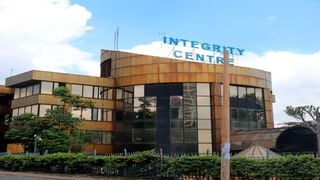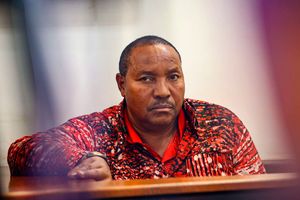
Integrity Centre that hosts Ethics and Anti-Corruption Commission (EACC) offices in Nairobi.
| File | Nation Media GroupOur Columnists
Premium
How graft became a divine right
Thou shalt not steal’ is a Christian doctrine. Muslims grow up with the notion that stealing is haram (forbidden). I bet other religions, including humanists and atheists, have strong views on stealing.
But stealing seems to go on unabated in Kenya, a country heaving with believers. There is nowhere I find stealing of public funds tolerated much more than in areas of Muslim majority—such as northeastern and the coastal regions—and, of course, churches. There are areas of northeastern, upper Eastern and Coast that are, to-date, the most under-developed.
Devolution was thought to be the panacea for faster growth in Kenya. It no longer seems so. It has now become the easiest way to embezzle public funds. ‘Devolved corruption’ is not just a catch-phrase but reality dogging many counties.
Northern and Coast counties are being pummelled by the heaviest rains recorded in recent times. Even the UK’s King Charles and the Queen were caught up in it while in Mombasa recently.
As is the norm, the ‘free’ waters will end up being wasted as there still are no mechanisms in place to harvest rainwater. Had the rainfall we have received just in the month of October and part of November been harvested, it would be enough to, perhaps, quench the thirst of arid and semi-arid lands (ASALs) till the next rainy season and beyond.
Northern counties have become synonymous with drought, hunger and now floods and impassable roads. As per the script, the leaders from the regions have, yet again, from the comfort of Nairobi City, called press conferences begging for support for ‘their people’.
I would have also liked to know what they have been doing since the inception of devolution to combat hardship in the north. The era of blaming under-development on being ‘ignored’ by the former British colony and post-Independence governments is long gone. There is no excuse for the northern areas to continue being the face of hunger and synonymous with begging, illiteracy, death and diseases.
Like many other counties, the northern ones have prioritised benefits to county heads as well as embezzlement. The budget for a governor’s mansion in one county in the north is enough (as a priority) to instal fresh-water taps, local dispensaries and schools in these far-flung areas of the country to help them to catch up with the more developed regions. In short, there is no excuse for northern residents to keep experiencing emergency situations that are of human creation.
Invest in properties
Kenyans on social media are asking where the leaders in the north find the money to invest in properties in Nairobi and other major cities within a short span of coming to power. The other question being asked is why they operate from the capital city and not their counties. I, too, ask—with vested interest as a northerner.
The north is suffering from myopic thinking and hypocrisy, exacerbated by religion and clanism. It is easier to hear condemnation of all other types of haram except theft of public funds. Corruption has been normalised in the north and in Muslim-dominant areas. And if one keeps his white kufiyya or burqa on and can afford to go on pilgrimage to Mecca on stolen money, then all is forgiven. But is it?
Mosques and churches, especially the ‘prosperity gospel’ ones, have become immune to corruption. They will gladly accept ‘dirty’ money from politicians without questioning its source if it will help them to build big churches and mosques. Some of the churches are built in areas that need more social amenities to help the poor congregants to survive on earth.
Don’t get me wrong. I am all for ‘House of God’ being built to nourish our spiritual side. But if that development comes at the expense of negating the socioeconomic progress of the poor, then it’s a sin. Do we need a good life while alive or being starved to build mosques and churches on stolen money for a deferred better future in the skies?
Apart from the odd conference to comment on the state of politics in Kenya, the major religions have taken a back seat when it comes to corruption. Their loud silence on the vice can only indicate that they see it as a ‘divine’ achievement that those masquerading as ‘religious’ can get away with.
Kenyan politics has made things worse by putting religion at the centre of its operations. After all, the two main religions—Christianity and Islam—are a huge voting bloc. Hence, rather than rock the boat, the politicians would rather take advantage of religion by appeasing voters using stolen public money. It, therefore, becomes quite difficult to hold to account a thieving politician who goes around building mosques and churches.
Why bite the hand that feeds you on this earth? But it is, in fact, moral to ‘bite’ a thieving politician’s hand for religious organisations to be seen to be truly walking the high moral ground. It’s time for religion to desecrate corruption in Kenya!
- Ms Guyo is a legal researcher. [email protected]. @kdiguyo





